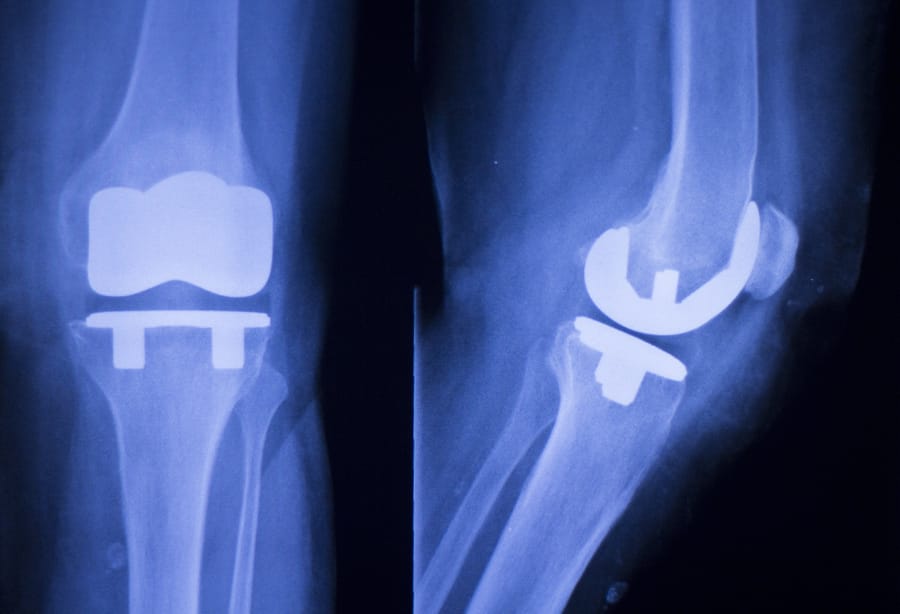An estimated 4.4 million Americans currently rely on artificial knee implants. These implants can be used to improve mobility and joint function, especially in the elderly. Knee replacement is one of the most common medical procedures in the U.S., and the DePuy knee replacement system has been one of the more popular options. However, after a known problem with the balseal spring was brought to light, DePuy recalled components of the Attune knee replacement device in 2015. Complications from a DePuy knee replacement or similar implant have required patients to undergo revision surgery to fix the issue. The DePuy knee replacement system is a popular knee implant option in the U.S. However, although the DePuy knee replacement was meant to reduce the time required for recovery, it has unfortunately been linked with some severe issues that can have lasting effects.
DePuy Knee Replacement Side Effects
Patients have reported a number of major DePuy knee replacement complications, including:
- Joint pain that makes it difficult and painful to walk and stand and move
- Failure to bond properly to the natural bone causing the implant to fail completely
- Worn out components that do not hold up as long as they are supposed to
- Loosening of the joint which leads to other knee, hip, and back problems
- Joint fractures and breaks of the bone in the legs where they meet the implant joint
- Joint instability which causes problems walking and standing and can result in falls
- Joint swelling that reduces mobility and cause pain, weakness, and numbness
- Device dislocation and shifting of the transplant device itself in the knee
- Nerve damage to the knee that makes it difficult or impossible to walk and stand
- Fracturing of knee system components that cause the implant to fail
- Fracturing of the femur or tibia due to improper support from the implant
- Decreased range of motion and weakness of the muscles and bones
- Improper alignment of the implant components that cause problems later on
- Tibial subsidence and shifting of the joints and dislocations of the surrounding area
- Grinding of the knee joint due to shifting of the implant and protruding implant parts
- Release of implant debris into the body and leaching of metal into the bloodstream
It is because of these symptoms and the increasing number of problems reported in connection to these implants that action was taken against the DePuy knee implants. The FDA even got involved and issued warnings and eventual recalls to protect the population from further injury. The U.S. Food and Drug Administration (FDA) announced the recall of certain DePuy Attune Knee system components after DePuy issued the recall back in June 2015. The recall announcement noted that the device’s small wire spring coil had the potential to become damaged and disassociate from the device. This could allow the spring to enter the surgical site and be left inside the patient after surgery, leading to complications. The recall affected 3,474 DePuy knee replacement units with potentially defective balseal components. All of this is largely due to the biggest issue people have with these Attune implants- the need for additional risky and expensive treatments to fix the damage that has been done.
The Biggest Issue With Transplants
Although these knee implant devices are meant to last for many years, some patients claim that they have experienced component or device failure only a couple of years after the initial knee replacement surgery occurred. The DePuy Attune is not the only knee implant system under fire for parts or device failure and other issues. Other knee replacement devices have also been linked with ailments and this is something that cannot be ignored any longer. When a knee transplant fails, the results can be devastating for the patient.
In many cases, after their joint replacement systems fail, patients are forced to undergo additional surgeries—such as revision or reconstructive surgeries—to repair or replace the failed implant, and correct any damage caused to the surrounding bone. These procedures are often far more painful and invasive than the initial knee replacement surgery They may require surgeons to break away components that have bonded to the bone improperly, or completely reconstruct parts of the bone destroyed by the implant. For many patients, revision and reconstructive surgeries are considered much riskier than their original knee replacement procedures. One reason is that first-time knee replacements are typically performed on members of an older patient population who, in the years between the joint replacement and device failure, have aged and may find themselves facing additional health challenges.
Contact Us Today
If you or someone you love was harmed by a faulty knee implant system by DePuy, our firm wants to help. There is no need to suffer in silence and simply live life in pain due to a failed implant or an unsafe procedure. We can help you seek justice and compensation for your injuries and help fight for your rights under state and federal consumer protection laws. Compensation may include past and future medical expenses, revision surgery, pain and suffering, and loss of wages among many others- all of which we can help you fight for. We have helped thousands of people receive the compensation deserved. We can help you file your claim and begin the process to get you compensated now. Call now for a free consultation appointment and a case review of your own!
